The Third Odyssey - An Elysian Tale
- Thread starter Crimson Lionheart
- Start date
-
We have updated our Community Code of Conduct. Please read through the new rules for the forum that are an integral part of Paradox Interactive’s User Agreement.
You are using an out of date browser. It may not display this or other websites correctly.
You should upgrade or use an alternative browser.
You should upgrade or use an alternative browser.
Threadmarks
View all 100 threadmarks
Reader mode
Reader mode
Recent threadmarks
Chapter 75: A Whole New World (1766-1775) Chapter 75.5: In Memoriam/Zimon I Chapter 76: Seize the Day (1775-1776) Chapter 77: The Dark Coast (1776-1785) Chapter 78: The Elysian Revolution (1785-1789) Chapter 78.5: In Memoriam/Maria I Chapter 79: Epilogue/Republican Ending (1789-1821) Chapter 79: Epilogue/Imperial Ending (1789-1821)An interesting ending, despite the clearly non-canonical republican government.  I await the monarchical ending with interest.
I await the monarchical ending with interest.
An interesting bookends for an empire that indeed began with a dream. It's quite nostalgic to see it end where it all began and with this timeline's Napoleon too 
And given how the name Andreas is quite legendary thanks to Age of Miracles I'm sure the Shatterer of Armies would be proud of his namesake despite loosing Elysia.
And given how the name Andreas is quite legendary thanks to Age of Miracles I'm sure the Shatterer of Armies would be proud of his namesake despite loosing Elysia.
Chapter 79: Epilogue/Imperial Ending (1789-1821)
Chapter 79: Epilogue/Imperial Ending (1789-1821)
Revolution. It had come to tear apart the fabric of the society that had come to exist among the Elysians, and divided families among political lines. With what was once the greatest power in the world crumbling into ruin, the future of the nation would come to engage into bitter conflict and civil strife. Revolutionaries who sought to liberate their people from the tyranny of the autocrat and create a republic based on the principles of liberty, while the loyalists who supported the monarchy and the traditional order would fight to preserve their homeland and end the uprising. As factionalism emerged to tear apart an Imperium, whoever emerged victorious would see a changing world.
The Empress and Autocrat of the Elysians, Maria I, would be sentenced to death for all the sins she had committed against her own people. As it seemed that the republican revolutionaries were on the verge of victory, the son of the autocrat would ascend upon the throne and bring the loyalists victory after victory. Andreas was both the greatest threat to the republican cause, and the best and last chance for the loyalists to end the uprising that was destroying Elysium. A living prodigy who displayed excellence far beyond that of a common Elysian monarch, his unparalleled military abilities were enough to give a glimmer of hope to his people, even as the foundations of the Imperium crumbled away both in the homeland and its overseas subjects.
Emperor Andreas would lead the Imperial Army into battle against Lavrentios Kairis, a former Imperial commander who defected to the revolutionary cause. The fate of a nation would be decided at the Battle of Alouion, a city within the Elysian heartland only two days march away from the Imperial city. And the fate of the world was about to change forever.
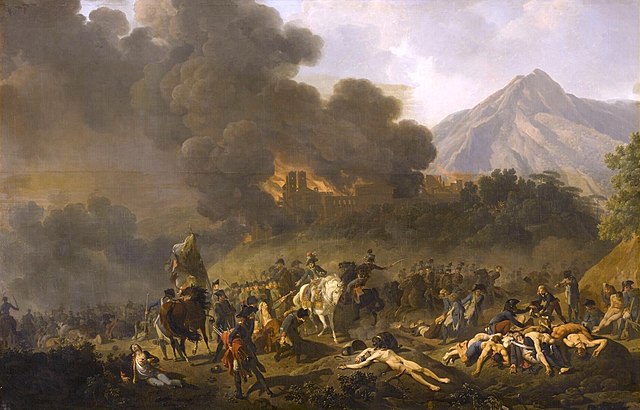
The Battle of Alouion, November 11th 1789. The battle that won the Revolution.
Both Republican and Imperial forces would meet on a large plain several kilometers away from the city, engaging in the early morning before the battle ending by nightfall. Holding an incredible advantage early into the battle, Andreas would lead the loyalists into breaking through on the republicans right flank, before the Emperor himself in the centre. By the time that Kairis would realise what was happening, the battle was over, and the republican army was routed.
As the world that the Empire had built would begin to crumble around them, Emperor Andreas would be seen and rewarded among the highest praises among the loyalists for what many of his subordinates had viewed as a decisive battle. As the Emperor marched towards Nea Konstantinopolis and the Imperial Armies gathered to recollect their strength against the revolutionary mobs, the loyalists would prepare to strike back against the traitorous republicans.
For the next three years, the Emperor would come to lead the loyalist cause into defeating the treachery of those who had sought to destroy the Imperium. The Emperor would win victory after victory, and overtime, the flames of the republican cause began to be snuffed out. Major land campaigns and naval theatres would be opened up against the republicans, and revolutionary strongholds and regions would be retaken one by one.
After the end of winter of 1792, what had once seemed like the end for the Empire to the revolution had turned itself completely around and was on the verge of total victory. With the Imperial Navy gaining control of the seas and the Thema coming to reassert Imperial authority over the Empire, breaking the revolutionary spirit as well as their numbers. With one final push, the revolution would be crushed before Christmas, ending seven years of civil war.

The nation, which was once divided, would be reunited as whole again. As brother had once fought brother, as father had once fought son, the dust would begin to settle on the end of the dying empire, the survivors and the victorious would come to ask if the revolution was worth it in the end. Despite the cost, the revolution was over, and forgiveness was the next step in what was being seen as a new age.
In the chaos that had lasted of seven years of continental civil war, many Imperial subjects would come to break away from Elysia or simply collapse from internal conflicts. While the old world dominions in the east would come crashing down, the west had remained loyal and steadfast within the Pacific Ocean. Abandoning looking to the east, it would come time to look towards the west instead.

Emperor Andreas I of Elysia sitting on his Imperial Throne, c. 1806
Following the end of the civil war, the republican dream was over. Many revolutionaries had died during the conflict, and its leadership had largely gone into hiding across the vast realm. Some of the most influential or powerful of the revolutionary leadership were taken alive, and would come to receive a trial for their crimes. Only the most senior of the revolutionary leadership would come to be executed for high treason, while many were largely imprisoned for many years or indefinitely within a fair trial. Those that survived were scared into submission and fled into the wilderness, and while discontent to autocratic rule would never go away, the Empire had survived what could have been a fatal blow. The Empire, and its new Autocratic rule, continued to live another day.
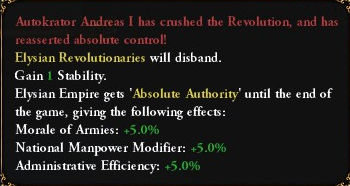
With the revolution dealt with, the empowered monarchy would come to allow Emperor Andreas to rule with absolute authority. Now having total control over the Imperium, the son of the autocrat would come to continue many of the reforms that she had originally proceeded with. Rather than embracing the reputation that she had embraced, Andreas would come to spend most of his reign building support among the people and extending an olive branch of peace towards them, looking to rebuild the image of the new autocratic rule.
Finding inspiration with some of the republican ideals, Andreas would come to embrace the more practical elements of their thought among with his own in the writing of the Andrean Code, the greatest codification of laws since the end of the Roman Empire, which included legal equality, established jury systems, legalized divorce, allowed freedom of religion and had set up a system of civil service where government jobs would go to the most qualified. Andreas had styled himself not as a republican, nor a truly autocratic monarch, but had styled himself as an enlightened despot who had embraced progressive modern thought.
The Imperial Senate, while having lost a vast majority of their powers and influence among the Imperial government and politics, would be recreated. Unlike the corrupt institution of old, Imperial Legislature would be divided among an Upper and Lower House, and serve to protect the Imperial constitution that Andreas I had established, a key element to the new era of the Empire. This new Imperial Senate were, politically, puppets to the monarchy and as an advisory council. The Imperial Senate now solely existed as an legitimate extension of the Emperor's will, not the other way around.

As the Elysian Empire moved into a new era into its history, Imperial authority had never been more powerful. To restore the prosperity that had been lost during the Elysian Revolution, Emperor Andreas would dedicate his life into modernizing Elysian society. Finances and the economy were regulated to control prices, new industries was encouraged and new roads and canals were built to improve upon the continental highway network. A new system of civil service based on the principles of meritocracy was promoted to ensure professional and well-trained officials and military officers, among with the creation of public schools under tight government control.
Andreas I would later win support across class lines, and become popular among the lower and middle classes. Upon the completion of the Andrean Code, the new Elysian society built by the Emperor would promote equality of all of its citizens before the law, religious toleration, and advancement based on virtue rather than birthright. Despite its progressive nature, Emperor Andreas would come to value order and authority over individual rights. The nobility would come to lose their privileges and birthrights, and women would lose many of their rights that had existed prior to the revolution, making the male head of a household have absolute control. Strict censorship would be implemented. Controlling aspects of the press, books, theater, and art, would occur under Andreas’s reign, part of his propaganda scheme, aimed at creating the image of the Emperor as a ruler desperately wanting peace and stability to Elysium while modernising its society, looking upon himself as an Elysian Augustus who would transform the nation in his reign.
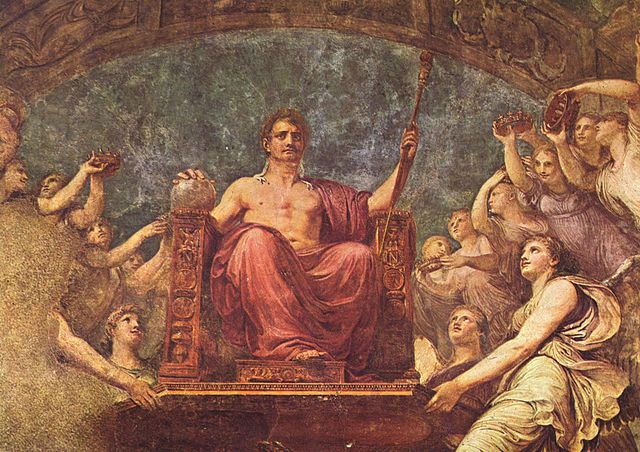
A heavily stylized mosaic of Emperor Andreas. Emphasizing the Roman heritage of Elysia, Andrean Propaganda was heavily focused upon utilizing heavy Roman symbolism.
Slavery, playing an important role in Elysian society, would continue under the Empire. Many abolitionist critics of slavery on the continent would come to oppose the ill-treatment of slaves, rather than practice of slavery itself. By the time of the revolution, slavery had been institutionalized as a racial caste associated with African ancestry. Largely built among pragmatism by the Emperor and the government, the more liberal monarch would come to maintain slavery on the continent for economic and agricultural benefit, rather than political and humane reasons.
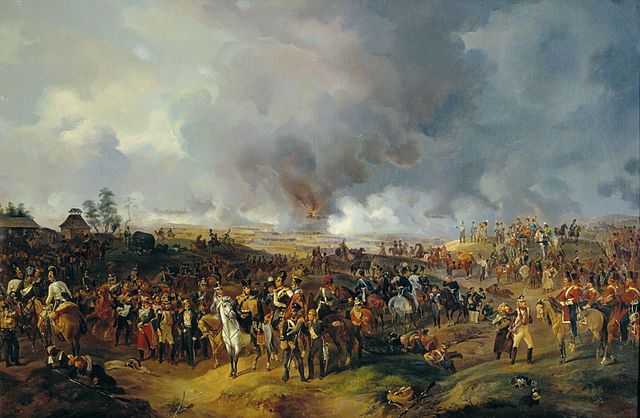
German forces winning a decisive victory at Leipzig against a combined Russian army during the Coalition Wars (1792-1815), a series of wars across the world as great powers fight for dominance. The victors of the Coalition Wars were often the ones who would come to lead the century.
In what was once the Elysian world, the old world had changed since the Revolution, the many exarchs that the Empire had been dependent on had collapsed under their own weight, and chaos would grip an entire continent and other subcontinents as elysian rule collapsed in the east. The Empire would stumble but not collapse, and the world they had spent centuries creating would begin to die over the next thirty years. For the Elysians, their time in the sun was over for now, and the world had changed, for better or worse.
With the end of Elysian domination over the old world, the collapse of their rule across the Atlantic had created a power vacuum that had effectively wiped the slate clean. Power and prestige in a new era of history was there for those willing to take it. Stretching from minor regional conflicts to large-scale continental wars, along with a constantly changing diplomatic nature of a network of alliances and coalitions looking to reassert themselves, the period of post-elysian rule would come to be Coalition Wars, a series of wars waged by various military alliances across the old world, that would last twenty five years.

The Maghreb, formerly under Imperial rule as the Exarchate of Mauritania, would emerge from the collapse of distant imperial rule under relatively stable circumstances. Morocco and Algiers would achieve independence and become major powers in former north africa, although remained as bitter rivals among one another. Meanwhile, a rogue Mauritanian general launches a coup against the dying exarch and crowned himself as King of Tunis and had looked outward to create a dominant north african kingdom of his own. Only Fezzan would rule in the south, but with every passing decade, the landscape of the region was changing as much as the saharan sands.

The Iberian Peninsular would come to see both Spain and Portugal achieve independence, overthrowing Hispanian dominance as both kingdoms would come to create their own destiny as free nations once more. The Kingdom of Portugal would achieve independence under a centralised government, while Spain would be plagued by civil war among pretenders to its reestablished throne, republicans who were inspired by the Elysian model and even cultural separatists. The Hispanian remnants, holding onto Leon and Galicia, would eventually fall under the combined might of Spain and Portugal, and its goal of reestablishing rule over a united Iberian monarchy was over.
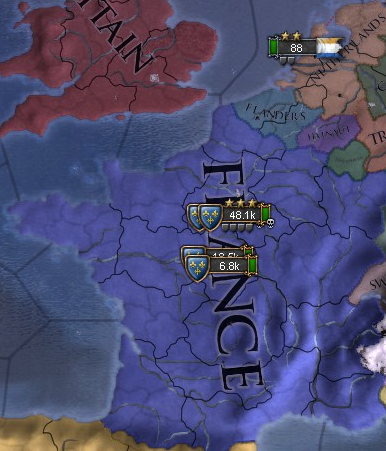
Across the Pyrenees, France would rise to dominance in the following decades of Imperial rule. The Exarchate of Gallia had become the first Exarch in the Old World to completely slip away from Imperial Control during the revolution. Instead of complete collapse like many other exarchs, the former exarch is overthrown quickly and efficiently from within, with the region surviving in one piece as a result. The Kingdom of France would emerge under the rule of King Charles X, and in the post-imperial world that had been left behind, France would become one of the great powers of its time.
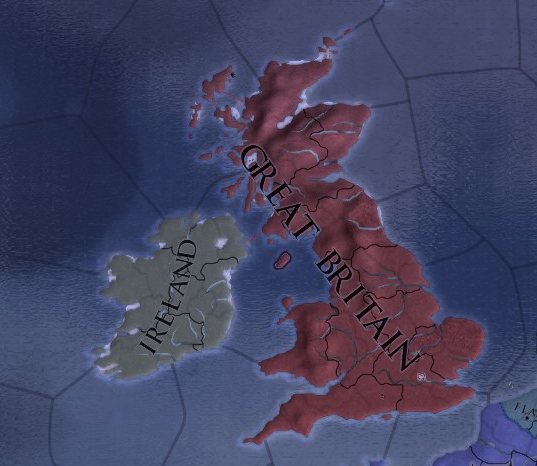
Across the Isle, a reborn Great Britain would come to be reborn and dominate the entire region. Unification among the isles would come to see the Kingdoms of England, Wales and Scotland unite to form a single kingdom encompassing the entire region. Ireland, existing as viceroyalty under the British crown, had been forcefully unified through many years of conflict, with preparations for eventual annexation into Great Britain as whole having been underway for years. Playing an important role during the Coalition Wars, Britain emerged as a strong industrialised kingdom that sat among the great powers of Europe. What it lacked for in size, Great Britain had made up for in ambition, and the kingdom was in a strong position to become a foremost world power.
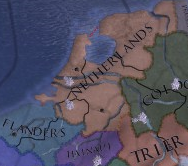
The Netherlands would break away from Elysian control, where its exiled government had returned back to their homelands to restore control over the newly independent region. During the Coalition Wars however, the Low Countries geographic position made them highly valuable between German and French interests. At the best of times, the Netherlands were able to preserve complete independence in the area in the north. In the south, the cultural divide in the region between the Flemish and Walloons was a conflict of interest among the French and Germans.
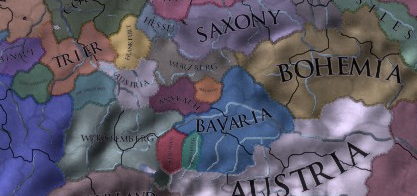
In what was once Germania, the German States had seen a tremendous rise and fall. Being united under the Elysian conquests of Central Europe, the exarchs collapsed far quicker than anybody had expected and a period of anarchy would come to descend upon the area. Neighboring powers, wishing to prevent the emergence of a united German state, turned the region into a battleground as means to curb their strength. Southern Germany, sitting in the crossroads of Europe, was divided among a collection of monarchies and republican states.
In the years following the collapse of the German Exarchs, and through a means of preventing political chaos from spreading beyond its borders while protecting its lands from foreign influence, the German states would come to be united under the German Confederation, created after the Coalition Wars, to coordinate the economies of separate German-speaking countries. Originally intended to become a modern replacement for the Holy Roman Empire and to intertwine the economies of the German states while protecting political sovereignty and preventing conflict with one another for dominance, the confederation would remain weak and ineffective due to the political rivalries between its six largest kingdoms..
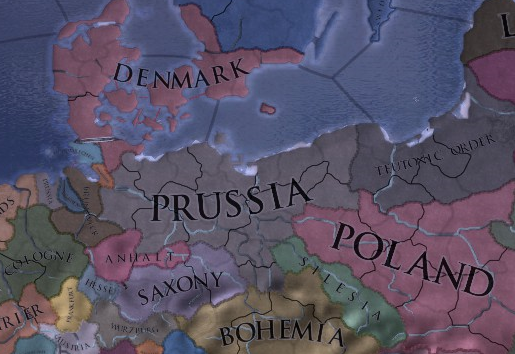
Northern Germany and Central Europe would come to find in a unique position throughout the Coalition Wars. While Germany would come to be known as a warzone during the period, the rise of the Kingdom of Prussia would come to counteract the interests of Austria in the south and emerge as one of the leaders of the German Confederation. While Bohemia and Poland would regain their independence following the Exarchs, their growth was prevented by German and Russian strength. Prussia would come to wage war against the monastic Teutonic Order in a war of unification.

Denmark, during the collapse of the Elysian World, would take the opportunity to seize the Kiel Canal, but sought to remain independent against the German states who remained weak but were growing economically, and a newly free Swedish kingdom in the north that sought to rebuild a unified Scandinavian kingdom in the north. Norway would achieve its independence, but would find itself as a diplomatic battleground between Danish and Swedish influence. What all three nordic nations would come to agree on is preserving the independence of Finland from Russian ambitions.
The Baltics would come to be fractured into three separate nations. Lithuania, Livonia and Estonia would emerge from the broken remnants of the Balticus, and once they had achieved their freedom, they had never looked back. Despite their freedom, they are completely surrounded by foreign powers who sought to conquer the region for its valuable position. As the revolution had occurred so suddenly, the former exarch that ruled the area had never been able to improve its local economies, leaving the region largely as a backwater in Eastern Europe.
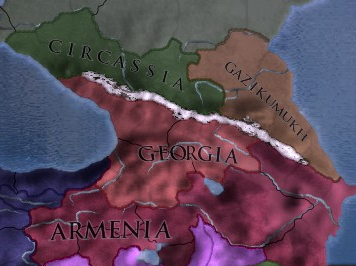
In the Caucasus, the diversity of the mountainous region had come to see the kingdoms that once made up the Exarchate of Armenia fracture among their ethnic lines. Georgia and Armenia would come to both dominate the south, while Circassia and Gazikumukh dominated the north. All four kingdoms would survive the collapse of the exarchs with moderate success, but would be surrounded by three separate powers on all sides, leading the crossroads of Europe and Asia into a very difficult position for its future.
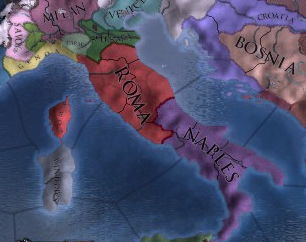
In what was once a period of greatness, the Exarch of Roma would oversee a partial collapse of its territories across the entire peninsular. Like their Germanic neighbours, the Italian Peninsula would collapse into a series of republics and kingdom, yet would come to remain wealthy due to heavy investment into the region during its united periods of Papal and Elysian rule. The Exarch of Roma would become the only Exarch to survive the collapse of the Elysian Empire, yet would come to renounce their Elysian masters, instead becoming a small kingdom that dominated Central Italy.
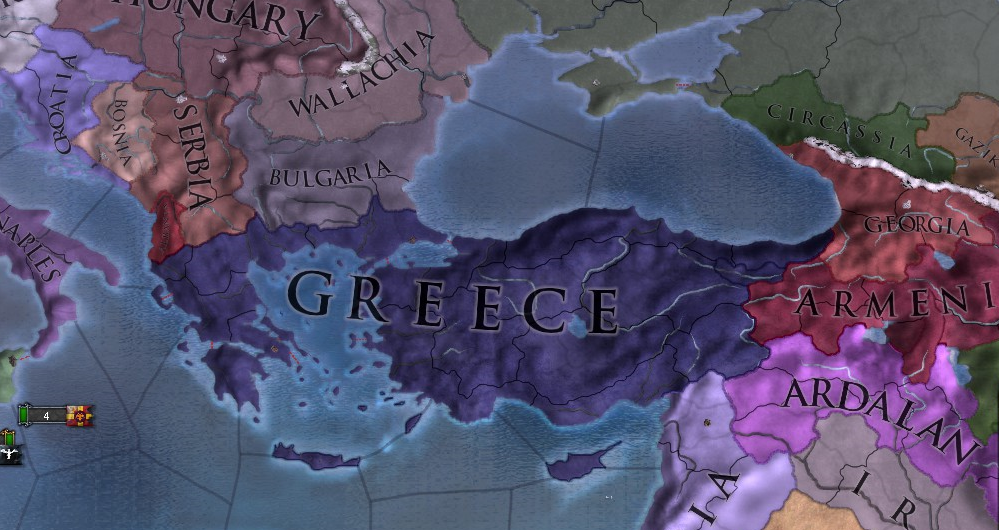
While the Elysians would survive their revolution, Constantina did not, and the Eastern Mediterranean would be radically different as a result. While Hellenic domination would once again come to exist in another form, the Balkans and the Near East would be changed beyond recognition. While the Balkans would remain as the powder keg that it had traditionally existed under, a new Kingdom of Greece would come to inherit many Roman and Elysian traditions, such as maintaining the Theme System. While seen as the economic and military power in the region, there were many that were concerned about a resurgent Hellenic state.
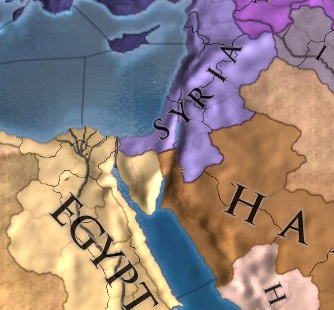
Across the sea, both Syria and Egypt existed as powerful opponents to Hellenic domination of the Eastern Mediterranean. While not as powerful as their northern rival, they were politically significant, with both the Kingdoms of Syria and Egypt holding close political ties with one another. Egypt would take the Suez Canal, while Syria would start to grow economically through the bustling markets of Damascus. The Jews of the region, long promised their homeland back under Elysian rule, were starting to see ethnic and political tensions against the Syrian monarchy, something which could erupt into a crisis in the region if not dealt with.

One of the ‘victors’ of the Coalition Wars, the Russian Tsardom had emerged relatively unscaved during the chaotic period. Still remaining weakened from the Elysian invasion during the 1770’s that crippled their nation, the Tsardom had remained dominant as a great power through its own power projection rather than its actual military and economic might. Despite its tremendous size, many of Russia’s rivals had viewed the Tsardom as a paper tiger, in that appeared threatening but was ineffective and weak.
Large disparity in terms of economics, ethnicity, and religion, along with a predominantly agricultural base with low productivity due to its unforgiving climate, the Russian Tsardom was slow to industrialize. Should Russia ever reach its full potential, it would have the capability to threaten all of Europe.

In the Arabian Peninsula, the region would come to see the collapse of the theocratic military order that had ruled over the region and see the replacement of many smaller states and regions. While having achieved their independence, the region was weak from internal infighting along with a religious split, where the christianisation of the peninsular had left a deep divide among the remaining Christians and Muslims in the area.
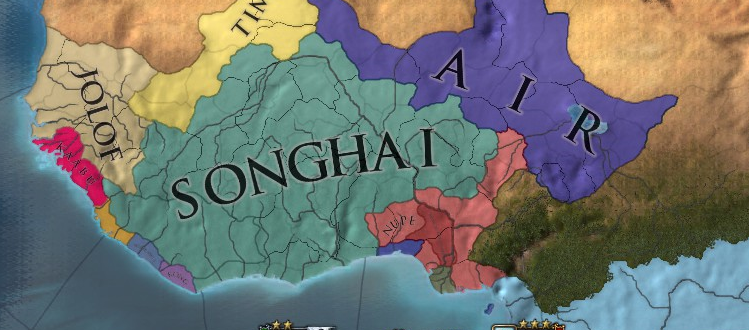
Western Africa would see the little changes during the time of the Elysian Empire, with borders largely remaining the same since the Elysians had arrived in the region to create their slave kingdoms in the region. Since the collapse, Europeans would come to take interest in the region and come to establish outposts of their own, while the once dominant Songhai were struggling to rule over their ethnically and religiously diverse nation.

Africa would come to be divided among three enormous yet separate empires. The Abyssinian Empire, located in the Horn of Africa, had recovered from the collapse and looked to disrupt the rule of their southern enemies. The Luba and Maravi Empires, two native yet dominant powers of the continent, had long been fighting among one another in a vicious rivalry.

The Exarch of Persis, ruling the lands of the Hindu Kush, would come to organise themselves as the rulers of a Christian Persian Empire once the Imperium had collapsed in the new world. While asserting dominance in its region, Persia would come to act as a dominant regional power, but had lacked the strength to push for territorial conquest outwards. Leaving Mesopotamia behind for now, both Mashriq and Kurdish nations would appear in the power vacuum left behind from the end of the old order, sitting dangerously in a vulnerable position.
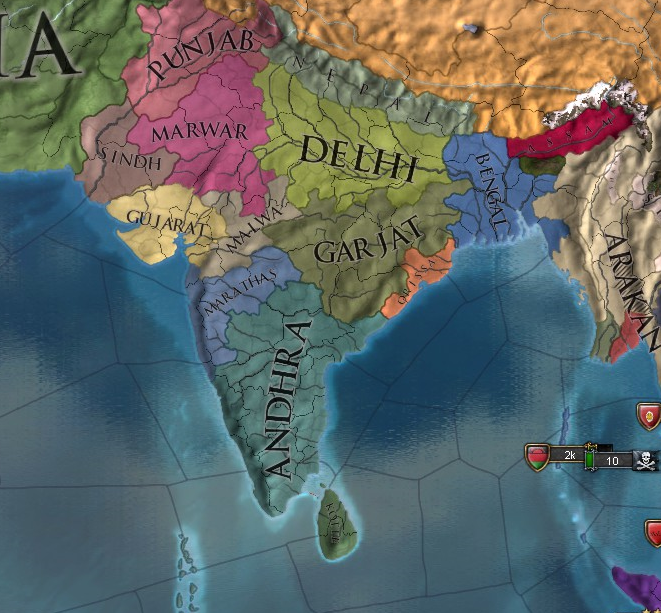
India, the subcontinent that was once home to a thriving kingdom, was far different from when the Elysian Empire had reached their peak. No longer was the region united under a single crown or flag, instead being made up of several kingdoms tired among cultural lines. Even among the chaos of the world beyond their lands, a relative peace would come to exist in the region, but the dream of a reunited Bharat would remain simply a dream for another generation, if it was to be a dream at all from now on.
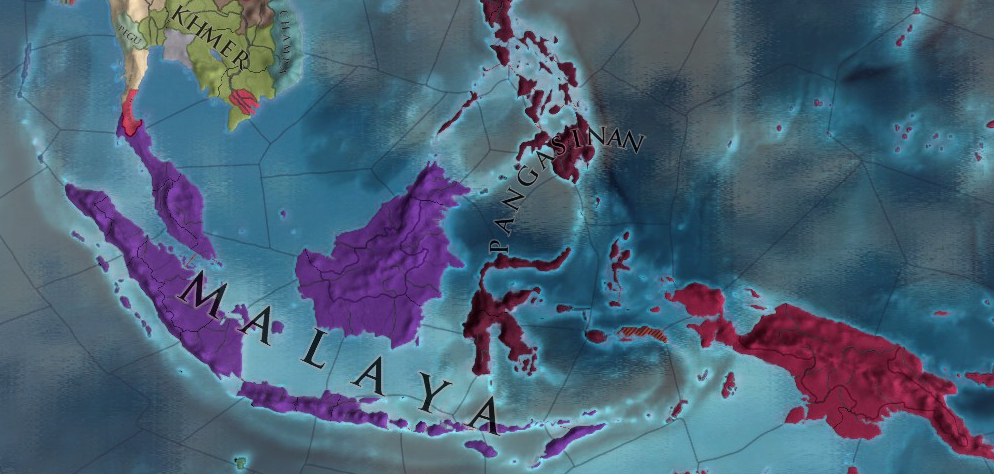
While the Elysians would come to falter in the revolution, the Majapahit Empire would launch their invasion across Nusantara as a means to conquer the region and recreate their ancient thalassocracy. While only particularly successful in seizing regions such as Borneo, the Majapahit would find that fighting in the region would prove much more difficult. Having remained loyal to the Empire and managing to survive the collapse that had gripped elsewhere in the world, Pangasinan had fought the Majapahit to a standstill, and the two powers would call for a truce. Over the coming decades, the Majapahit would redesign themselves as the Malaya Empire and placed emphasis on the region's cultural identity, while Pangasinan would keep loyal to the Elysians across the ocean. Collectively, they would be known as the ‘Spice Kingdoms’ among the Europeans, due to both of them holding a monopoly of the valuable commodity in their respective regions.
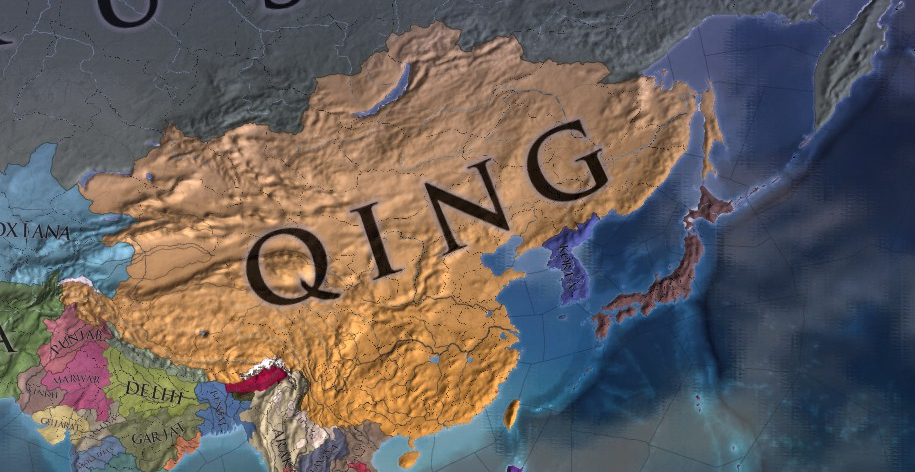
The Qing Dynasty would, by 1821, reach it’s apogee. Holding a vast multicultural empire that was one of the most powerful states of its time, the Qing project power far beyond their own borders through a tributary system that stretched across Southeast Asia and held almost complete hegemony of the region. Despite reaching its peak, an internal decline in prosperity would begin due to poor economic policies. Nearby Korea would come to submit as a tributary subject of the Qing, while the Otomo Shogunate entered into a period of diplomatic isolation with limited influence from the outside world, entering into an era of peace.
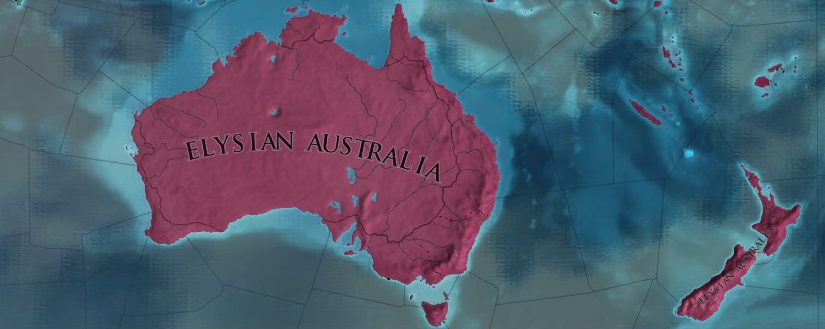
Australia, the Elysian colonial realm, would remain deeply loyal to the Empire even if the revolution had damaged the rest of the world. While having lost all of their lands across the Atlantic, Emperor Andreas was determined to not lose the Pacific and the West, and had come to invest heavily into the vast seas in the area. Australia and Notia Edafi, while coming to have a stable population across the entire continent, would remain administered by the Empire as its crown jewel in Asia. Its new colonial capital, Aurelia, would be located among the east coast, and develop the nickname as the ‘Constantinople of the South’ due to its valuable harbours.
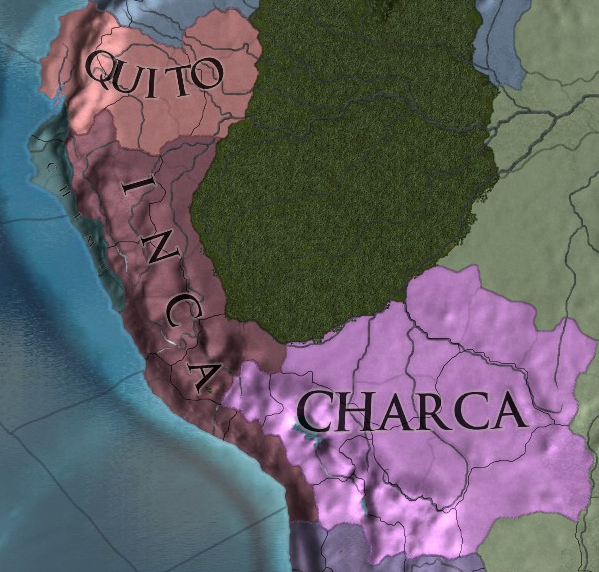
The Inca Empire, known in its native language as Tawantinsuyu, was left in utter shambles following the social upheaval that occurred during the Elysian Revolution and the Coalition Wars that would come to follow. Cultural and ethnic separatism, economic collapse and republicans that were inspired by the Elysians would tear the nation apart within a thirty year period. In the aftermath, what was once an Empire had utterly collapsed. While the Incan monarchy would survive this chaotic period, if only by the slimmest of margins, a dark period would come to emerge for the broken nation...

Elsewhere in Retoria, the impact of the Coalition Wars was not just limited to the Old World. Inca and Brazil would come to see an uprising among the Spanish populace, where a war of independence among the subjugated Spanish people of the continent that fought tooth and nail against both nations. For the next decade, La Platia was able to defeat both Brazil and Inca and achieve complete sovereignty among their home territories. Columbia, Brazil and La Platia would come to emerge in this new century as monarchies, surviving the chaos that had gripped the rest of the world.

As the world begins to look into the next era of history, the winds of change had come to transform the fortune of nations. Nations had changed and reached new heights of might and prosperity, and the world looked in excitement or horror at the revolutionary transformation that was spreading among society. For the Elysians, what began as an exiled people would come to see them transform themselves into the greatest empire in history, one that had changed the foundations of society across the globe. And as the Empire would enter into a new era, they would never forget about their origins, nor would they ever forget the odyssey that had saved a once doomed people. From humble beginnings, the foundation and desire for greatness had changed the world.
And it began with a dream.
(And this is it! This is the second ending of the AAR. Many events in both endings happened no matter what, so many elements are copied over from each other. Except we have the surviving monarchy this time around. I might make a few more bonus chapters, but as of now, this is the last major chapter. Once again, thank you for reading!
Revolution. It had come to tear apart the fabric of the society that had come to exist among the Elysians, and divided families among political lines. With what was once the greatest power in the world crumbling into ruin, the future of the nation would come to engage into bitter conflict and civil strife. Revolutionaries who sought to liberate their people from the tyranny of the autocrat and create a republic based on the principles of liberty, while the loyalists who supported the monarchy and the traditional order would fight to preserve their homeland and end the uprising. As factionalism emerged to tear apart an Imperium, whoever emerged victorious would see a changing world.
The Empress and Autocrat of the Elysians, Maria I, would be sentenced to death for all the sins she had committed against her own people. As it seemed that the republican revolutionaries were on the verge of victory, the son of the autocrat would ascend upon the throne and bring the loyalists victory after victory. Andreas was both the greatest threat to the republican cause, and the best and last chance for the loyalists to end the uprising that was destroying Elysium. A living prodigy who displayed excellence far beyond that of a common Elysian monarch, his unparalleled military abilities were enough to give a glimmer of hope to his people, even as the foundations of the Imperium crumbled away both in the homeland and its overseas subjects.
Emperor Andreas would lead the Imperial Army into battle against Lavrentios Kairis, a former Imperial commander who defected to the revolutionary cause. The fate of a nation would be decided at the Battle of Alouion, a city within the Elysian heartland only two days march away from the Imperial city. And the fate of the world was about to change forever.
The Battle of Alouion, November 11th 1789. The battle that won the Revolution.
Both Republican and Imperial forces would meet on a large plain several kilometers away from the city, engaging in the early morning before the battle ending by nightfall. Holding an incredible advantage early into the battle, Andreas would lead the loyalists into breaking through on the republicans right flank, before the Emperor himself in the centre. By the time that Kairis would realise what was happening, the battle was over, and the republican army was routed.
As the world that the Empire had built would begin to crumble around them, Emperor Andreas would be seen and rewarded among the highest praises among the loyalists for what many of his subordinates had viewed as a decisive battle. As the Emperor marched towards Nea Konstantinopolis and the Imperial Armies gathered to recollect their strength against the revolutionary mobs, the loyalists would prepare to strike back against the traitorous republicans.
For the next three years, the Emperor would come to lead the loyalist cause into defeating the treachery of those who had sought to destroy the Imperium. The Emperor would win victory after victory, and overtime, the flames of the republican cause began to be snuffed out. Major land campaigns and naval theatres would be opened up against the republicans, and revolutionary strongholds and regions would be retaken one by one.
After the end of winter of 1792, what had once seemed like the end for the Empire to the revolution had turned itself completely around and was on the verge of total victory. With the Imperial Navy gaining control of the seas and the Thema coming to reassert Imperial authority over the Empire, breaking the revolutionary spirit as well as their numbers. With one final push, the revolution would be crushed before Christmas, ending seven years of civil war.
The nation, which was once divided, would be reunited as whole again. As brother had once fought brother, as father had once fought son, the dust would begin to settle on the end of the dying empire, the survivors and the victorious would come to ask if the revolution was worth it in the end. Despite the cost, the revolution was over, and forgiveness was the next step in what was being seen as a new age.
In the chaos that had lasted of seven years of continental civil war, many Imperial subjects would come to break away from Elysia or simply collapse from internal conflicts. While the old world dominions in the east would come crashing down, the west had remained loyal and steadfast within the Pacific Ocean. Abandoning looking to the east, it would come time to look towards the west instead.
Emperor Andreas I of Elysia sitting on his Imperial Throne, c. 1806
Following the end of the civil war, the republican dream was over. Many revolutionaries had died during the conflict, and its leadership had largely gone into hiding across the vast realm. Some of the most influential or powerful of the revolutionary leadership were taken alive, and would come to receive a trial for their crimes. Only the most senior of the revolutionary leadership would come to be executed for high treason, while many were largely imprisoned for many years or indefinitely within a fair trial. Those that survived were scared into submission and fled into the wilderness, and while discontent to autocratic rule would never go away, the Empire had survived what could have been a fatal blow. The Empire, and its new Autocratic rule, continued to live another day.
With the revolution dealt with, the empowered monarchy would come to allow Emperor Andreas to rule with absolute authority. Now having total control over the Imperium, the son of the autocrat would come to continue many of the reforms that she had originally proceeded with. Rather than embracing the reputation that she had embraced, Andreas would come to spend most of his reign building support among the people and extending an olive branch of peace towards them, looking to rebuild the image of the new autocratic rule.
Finding inspiration with some of the republican ideals, Andreas would come to embrace the more practical elements of their thought among with his own in the writing of the Andrean Code, the greatest codification of laws since the end of the Roman Empire, which included legal equality, established jury systems, legalized divorce, allowed freedom of religion and had set up a system of civil service where government jobs would go to the most qualified. Andreas had styled himself not as a republican, nor a truly autocratic monarch, but had styled himself as an enlightened despot who had embraced progressive modern thought.
The Imperial Senate, while having lost a vast majority of their powers and influence among the Imperial government and politics, would be recreated. Unlike the corrupt institution of old, Imperial Legislature would be divided among an Upper and Lower House, and serve to protect the Imperial constitution that Andreas I had established, a key element to the new era of the Empire. This new Imperial Senate were, politically, puppets to the monarchy and as an advisory council. The Imperial Senate now solely existed as an legitimate extension of the Emperor's will, not the other way around.
As the Elysian Empire moved into a new era into its history, Imperial authority had never been more powerful. To restore the prosperity that had been lost during the Elysian Revolution, Emperor Andreas would dedicate his life into modernizing Elysian society. Finances and the economy were regulated to control prices, new industries was encouraged and new roads and canals were built to improve upon the continental highway network. A new system of civil service based on the principles of meritocracy was promoted to ensure professional and well-trained officials and military officers, among with the creation of public schools under tight government control.
Andreas I would later win support across class lines, and become popular among the lower and middle classes. Upon the completion of the Andrean Code, the new Elysian society built by the Emperor would promote equality of all of its citizens before the law, religious toleration, and advancement based on virtue rather than birthright. Despite its progressive nature, Emperor Andreas would come to value order and authority over individual rights. The nobility would come to lose their privileges and birthrights, and women would lose many of their rights that had existed prior to the revolution, making the male head of a household have absolute control. Strict censorship would be implemented. Controlling aspects of the press, books, theater, and art, would occur under Andreas’s reign, part of his propaganda scheme, aimed at creating the image of the Emperor as a ruler desperately wanting peace and stability to Elysium while modernising its society, looking upon himself as an Elysian Augustus who would transform the nation in his reign.
A heavily stylized mosaic of Emperor Andreas. Emphasizing the Roman heritage of Elysia, Andrean Propaganda was heavily focused upon utilizing heavy Roman symbolism.
Slavery, playing an important role in Elysian society, would continue under the Empire. Many abolitionist critics of slavery on the continent would come to oppose the ill-treatment of slaves, rather than practice of slavery itself. By the time of the revolution, slavery had been institutionalized as a racial caste associated with African ancestry. Largely built among pragmatism by the Emperor and the government, the more liberal monarch would come to maintain slavery on the continent for economic and agricultural benefit, rather than political and humane reasons.
German forces winning a decisive victory at Leipzig against a combined Russian army during the Coalition Wars (1792-1815), a series of wars across the world as great powers fight for dominance. The victors of the Coalition Wars were often the ones who would come to lead the century.
In what was once the Elysian world, the old world had changed since the Revolution, the many exarchs that the Empire had been dependent on had collapsed under their own weight, and chaos would grip an entire continent and other subcontinents as elysian rule collapsed in the east. The Empire would stumble but not collapse, and the world they had spent centuries creating would begin to die over the next thirty years. For the Elysians, their time in the sun was over for now, and the world had changed, for better or worse.
With the end of Elysian domination over the old world, the collapse of their rule across the Atlantic had created a power vacuum that had effectively wiped the slate clean. Power and prestige in a new era of history was there for those willing to take it. Stretching from minor regional conflicts to large-scale continental wars, along with a constantly changing diplomatic nature of a network of alliances and coalitions looking to reassert themselves, the period of post-elysian rule would come to be Coalition Wars, a series of wars waged by various military alliances across the old world, that would last twenty five years.
The Maghreb, formerly under Imperial rule as the Exarchate of Mauritania, would emerge from the collapse of distant imperial rule under relatively stable circumstances. Morocco and Algiers would achieve independence and become major powers in former north africa, although remained as bitter rivals among one another. Meanwhile, a rogue Mauritanian general launches a coup against the dying exarch and crowned himself as King of Tunis and had looked outward to create a dominant north african kingdom of his own. Only Fezzan would rule in the south, but with every passing decade, the landscape of the region was changing as much as the saharan sands.
The Iberian Peninsular would come to see both Spain and Portugal achieve independence, overthrowing Hispanian dominance as both kingdoms would come to create their own destiny as free nations once more. The Kingdom of Portugal would achieve independence under a centralised government, while Spain would be plagued by civil war among pretenders to its reestablished throne, republicans who were inspired by the Elysian model and even cultural separatists. The Hispanian remnants, holding onto Leon and Galicia, would eventually fall under the combined might of Spain and Portugal, and its goal of reestablishing rule over a united Iberian monarchy was over.
Across the Pyrenees, France would rise to dominance in the following decades of Imperial rule. The Exarchate of Gallia had become the first Exarch in the Old World to completely slip away from Imperial Control during the revolution. Instead of complete collapse like many other exarchs, the former exarch is overthrown quickly and efficiently from within, with the region surviving in one piece as a result. The Kingdom of France would emerge under the rule of King Charles X, and in the post-imperial world that had been left behind, France would become one of the great powers of its time.
Across the Isle, a reborn Great Britain would come to be reborn and dominate the entire region. Unification among the isles would come to see the Kingdoms of England, Wales and Scotland unite to form a single kingdom encompassing the entire region. Ireland, existing as viceroyalty under the British crown, had been forcefully unified through many years of conflict, with preparations for eventual annexation into Great Britain as whole having been underway for years. Playing an important role during the Coalition Wars, Britain emerged as a strong industrialised kingdom that sat among the great powers of Europe. What it lacked for in size, Great Britain had made up for in ambition, and the kingdom was in a strong position to become a foremost world power.
The Netherlands would break away from Elysian control, where its exiled government had returned back to their homelands to restore control over the newly independent region. During the Coalition Wars however, the Low Countries geographic position made them highly valuable between German and French interests. At the best of times, the Netherlands were able to preserve complete independence in the area in the north. In the south, the cultural divide in the region between the Flemish and Walloons was a conflict of interest among the French and Germans.
In what was once Germania, the German States had seen a tremendous rise and fall. Being united under the Elysian conquests of Central Europe, the exarchs collapsed far quicker than anybody had expected and a period of anarchy would come to descend upon the area. Neighboring powers, wishing to prevent the emergence of a united German state, turned the region into a battleground as means to curb their strength. Southern Germany, sitting in the crossroads of Europe, was divided among a collection of monarchies and republican states.
In the years following the collapse of the German Exarchs, and through a means of preventing political chaos from spreading beyond its borders while protecting its lands from foreign influence, the German states would come to be united under the German Confederation, created after the Coalition Wars, to coordinate the economies of separate German-speaking countries. Originally intended to become a modern replacement for the Holy Roman Empire and to intertwine the economies of the German states while protecting political sovereignty and preventing conflict with one another for dominance, the confederation would remain weak and ineffective due to the political rivalries between its six largest kingdoms..
Northern Germany and Central Europe would come to find in a unique position throughout the Coalition Wars. While Germany would come to be known as a warzone during the period, the rise of the Kingdom of Prussia would come to counteract the interests of Austria in the south and emerge as one of the leaders of the German Confederation. While Bohemia and Poland would regain their independence following the Exarchs, their growth was prevented by German and Russian strength. Prussia would come to wage war against the monastic Teutonic Order in a war of unification.
Denmark, during the collapse of the Elysian World, would take the opportunity to seize the Kiel Canal, but sought to remain independent against the German states who remained weak but were growing economically, and a newly free Swedish kingdom in the north that sought to rebuild a unified Scandinavian kingdom in the north. Norway would achieve its independence, but would find itself as a diplomatic battleground between Danish and Swedish influence. What all three nordic nations would come to agree on is preserving the independence of Finland from Russian ambitions.
The Baltics would come to be fractured into three separate nations. Lithuania, Livonia and Estonia would emerge from the broken remnants of the Balticus, and once they had achieved their freedom, they had never looked back. Despite their freedom, they are completely surrounded by foreign powers who sought to conquer the region for its valuable position. As the revolution had occurred so suddenly, the former exarch that ruled the area had never been able to improve its local economies, leaving the region largely as a backwater in Eastern Europe.
In the Caucasus, the diversity of the mountainous region had come to see the kingdoms that once made up the Exarchate of Armenia fracture among their ethnic lines. Georgia and Armenia would come to both dominate the south, while Circassia and Gazikumukh dominated the north. All four kingdoms would survive the collapse of the exarchs with moderate success, but would be surrounded by three separate powers on all sides, leading the crossroads of Europe and Asia into a very difficult position for its future.
In what was once a period of greatness, the Exarch of Roma would oversee a partial collapse of its territories across the entire peninsular. Like their Germanic neighbours, the Italian Peninsula would collapse into a series of republics and kingdom, yet would come to remain wealthy due to heavy investment into the region during its united periods of Papal and Elysian rule. The Exarch of Roma would become the only Exarch to survive the collapse of the Elysian Empire, yet would come to renounce their Elysian masters, instead becoming a small kingdom that dominated Central Italy.
While the Elysians would survive their revolution, Constantina did not, and the Eastern Mediterranean would be radically different as a result. While Hellenic domination would once again come to exist in another form, the Balkans and the Near East would be changed beyond recognition. While the Balkans would remain as the powder keg that it had traditionally existed under, a new Kingdom of Greece would come to inherit many Roman and Elysian traditions, such as maintaining the Theme System. While seen as the economic and military power in the region, there were many that were concerned about a resurgent Hellenic state.
Across the sea, both Syria and Egypt existed as powerful opponents to Hellenic domination of the Eastern Mediterranean. While not as powerful as their northern rival, they were politically significant, with both the Kingdoms of Syria and Egypt holding close political ties with one another. Egypt would take the Suez Canal, while Syria would start to grow economically through the bustling markets of Damascus. The Jews of the region, long promised their homeland back under Elysian rule, were starting to see ethnic and political tensions against the Syrian monarchy, something which could erupt into a crisis in the region if not dealt with.
One of the ‘victors’ of the Coalition Wars, the Russian Tsardom had emerged relatively unscaved during the chaotic period. Still remaining weakened from the Elysian invasion during the 1770’s that crippled their nation, the Tsardom had remained dominant as a great power through its own power projection rather than its actual military and economic might. Despite its tremendous size, many of Russia’s rivals had viewed the Tsardom as a paper tiger, in that appeared threatening but was ineffective and weak.
Large disparity in terms of economics, ethnicity, and religion, along with a predominantly agricultural base with low productivity due to its unforgiving climate, the Russian Tsardom was slow to industrialize. Should Russia ever reach its full potential, it would have the capability to threaten all of Europe.
In the Arabian Peninsula, the region would come to see the collapse of the theocratic military order that had ruled over the region and see the replacement of many smaller states and regions. While having achieved their independence, the region was weak from internal infighting along with a religious split, where the christianisation of the peninsular had left a deep divide among the remaining Christians and Muslims in the area.
Western Africa would see the little changes during the time of the Elysian Empire, with borders largely remaining the same since the Elysians had arrived in the region to create their slave kingdoms in the region. Since the collapse, Europeans would come to take interest in the region and come to establish outposts of their own, while the once dominant Songhai were struggling to rule over their ethnically and religiously diverse nation.
Africa would come to be divided among three enormous yet separate empires. The Abyssinian Empire, located in the Horn of Africa, had recovered from the collapse and looked to disrupt the rule of their southern enemies. The Luba and Maravi Empires, two native yet dominant powers of the continent, had long been fighting among one another in a vicious rivalry.
The Exarch of Persis, ruling the lands of the Hindu Kush, would come to organise themselves as the rulers of a Christian Persian Empire once the Imperium had collapsed in the new world. While asserting dominance in its region, Persia would come to act as a dominant regional power, but had lacked the strength to push for territorial conquest outwards. Leaving Mesopotamia behind for now, both Mashriq and Kurdish nations would appear in the power vacuum left behind from the end of the old order, sitting dangerously in a vulnerable position.
India, the subcontinent that was once home to a thriving kingdom, was far different from when the Elysian Empire had reached their peak. No longer was the region united under a single crown or flag, instead being made up of several kingdoms tired among cultural lines. Even among the chaos of the world beyond their lands, a relative peace would come to exist in the region, but the dream of a reunited Bharat would remain simply a dream for another generation, if it was to be a dream at all from now on.
While the Elysians would come to falter in the revolution, the Majapahit Empire would launch their invasion across Nusantara as a means to conquer the region and recreate their ancient thalassocracy. While only particularly successful in seizing regions such as Borneo, the Majapahit would find that fighting in the region would prove much more difficult. Having remained loyal to the Empire and managing to survive the collapse that had gripped elsewhere in the world, Pangasinan had fought the Majapahit to a standstill, and the two powers would call for a truce. Over the coming decades, the Majapahit would redesign themselves as the Malaya Empire and placed emphasis on the region's cultural identity, while Pangasinan would keep loyal to the Elysians across the ocean. Collectively, they would be known as the ‘Spice Kingdoms’ among the Europeans, due to both of them holding a monopoly of the valuable commodity in their respective regions.
The Qing Dynasty would, by 1821, reach it’s apogee. Holding a vast multicultural empire that was one of the most powerful states of its time, the Qing project power far beyond their own borders through a tributary system that stretched across Southeast Asia and held almost complete hegemony of the region. Despite reaching its peak, an internal decline in prosperity would begin due to poor economic policies. Nearby Korea would come to submit as a tributary subject of the Qing, while the Otomo Shogunate entered into a period of diplomatic isolation with limited influence from the outside world, entering into an era of peace.
Australia, the Elysian colonial realm, would remain deeply loyal to the Empire even if the revolution had damaged the rest of the world. While having lost all of their lands across the Atlantic, Emperor Andreas was determined to not lose the Pacific and the West, and had come to invest heavily into the vast seas in the area. Australia and Notia Edafi, while coming to have a stable population across the entire continent, would remain administered by the Empire as its crown jewel in Asia. Its new colonial capital, Aurelia, would be located among the east coast, and develop the nickname as the ‘Constantinople of the South’ due to its valuable harbours.
The Inca Empire, known in its native language as Tawantinsuyu, was left in utter shambles following the social upheaval that occurred during the Elysian Revolution and the Coalition Wars that would come to follow. Cultural and ethnic separatism, economic collapse and republicans that were inspired by the Elysians would tear the nation apart within a thirty year period. In the aftermath, what was once an Empire had utterly collapsed. While the Incan monarchy would survive this chaotic period, if only by the slimmest of margins, a dark period would come to emerge for the broken nation...
Elsewhere in Retoria, the impact of the Coalition Wars was not just limited to the Old World. Inca and Brazil would come to see an uprising among the Spanish populace, where a war of independence among the subjugated Spanish people of the continent that fought tooth and nail against both nations. For the next decade, La Platia was able to defeat both Brazil and Inca and achieve complete sovereignty among their home territories. Columbia, Brazil and La Platia would come to emerge in this new century as monarchies, surviving the chaos that had gripped the rest of the world.
As the world begins to look into the next era of history, the winds of change had come to transform the fortune of nations. Nations had changed and reached new heights of might and prosperity, and the world looked in excitement or horror at the revolutionary transformation that was spreading among society. For the Elysians, what began as an exiled people would come to see them transform themselves into the greatest empire in history, one that had changed the foundations of society across the globe. And as the Empire would enter into a new era, they would never forget about their origins, nor would they ever forget the odyssey that had saved a once doomed people. From humble beginnings, the foundation and desire for greatness had changed the world.
And it began with a dream.
(And this is it! This is the second ending of the AAR. Many events in both endings happened no matter what, so many elements are copied over from each other. Except we have the surviving monarchy this time around. I might make a few more bonus chapters, but as of now, this is the last major chapter. Once again, thank you for reading!
Last edited:
Another fitting end for the Elysians, though unpopular opinion but I kinda preferred the Republican ending solely because of the bookend ending, despite that however Andreas certainly lived up to his status as the Napoleon of this timeline. He'd be remembered fondly by the people for sure.
This ending is just as good as the first. Be interested in seeing if the resurgent Greece would become a Byzantine Republic.
I think it a bit unfair to Andreas to saddle him with the portrait of a dyspeptic looking Corsican upstart 
I liked both endings, although I confess to feeling a bit disappointed that both resulted in the loss of Europe and the various exarchates. It would have been interesting to see them united in either a republican Elysian Commonwealth or as part of a greater Elysian Empire that stretched across the entire globe.
Hello everyone, thank you for your continued support for this AAR despite its conclusion. After much thinking, I have decided to wrap things up on a positive note and end this AAR than rather extending its 'life' with unnecessary bonus content. For someone who originally entered the AAR writing scene with no skills whatsoever, the amount of support that I have received for this has been overwhelming and has encouraged me to look into alternate future projects, some of which might be coming sooner than you think!
As someone who had been dealing with depression and other nasty stuff for quite a long time, being able to make something so positive for this community has truly uplifted my spirits and has improved my confidence and outlook on life. The experience writing this has been incredibly rewarding and positive and has given me something to express myself with, and I cant thank everyone enough for their support. I wish to thank everybody from the bottom of my heart, you are just incredible.
Thank you for reading everyone. Hope everyone has a good night
As someone who had been dealing with depression and other nasty stuff for quite a long time, being able to make something so positive for this community has truly uplifted my spirits and has improved my confidence and outlook on life. The experience writing this has been incredibly rewarding and positive and has given me something to express myself with, and I cant thank everyone enough for their support. I wish to thank everybody from the bottom of my heart, you are just incredible.
Thank you for reading everyone. Hope everyone has a good night
I am certain that this AAR is unique and will be remembered in the coming years here, it was a great story with a great mod and it's even greater that you got more than just some satisfaction out of it as well as of the community. I'll definitely look forward to your other projects.
It has been a delight to following this AAR, and I am very pleased you found yourself enjoying the process. Should you ever get that writing itch again, I am sure you would be most welcomed 
I've finally finished reading this AAR, and whoof! It took me a long time to do it!
First of all, thank you. Third Odyssey has been one of my favorite mods since Lichtkang made the first version, and seeing it taking the form of a full story from start is amazing.
And second, both endings are really good, but the Republican one really makes me smile after reading every chapter. Its really poetic how, in the end, the Empire came back to Constantinople after fleeing from it to survive: an entire cycle of glory, with highs and lows, and a good come back to the Shire at the end. Plus, the world seems like a better place to live.
Please continue writing, as I'm already subbed to your Venice AAR. Keep up the amazing work, @Crimson Lionheart !
First of all, thank you. Third Odyssey has been one of my favorite mods since Lichtkang made the first version, and seeing it taking the form of a full story from start is amazing.
And second, both endings are really good, but the Republican one really makes me smile after reading every chapter. Its really poetic how, in the end, the Empire came back to Constantinople after fleeing from it to survive: an entire cycle of glory, with highs and lows, and a good come back to the Shire at the end. Plus, the world seems like a better place to live.
Please continue writing, as I'm already subbed to your Venice AAR. Keep up the amazing work, @Crimson Lionheart !
- 1
bro i have idea maby you back in time to third crusade and dismiss elyric culture and elyshi and add another group civilised group of natives
bro i have idea maby you back in time to third crusade and dismiss elyric culture and elyshi and add another group civilised group of natives
Glad to see that people are still interested and enjoying this AAR. I'm actually planning to do another Third Odyssey AAR in the future, so stay tuned!*gasp* Necromancy!
- 1
Threadmarks
View all 100 threadmarks
Reader mode
Reader mode

